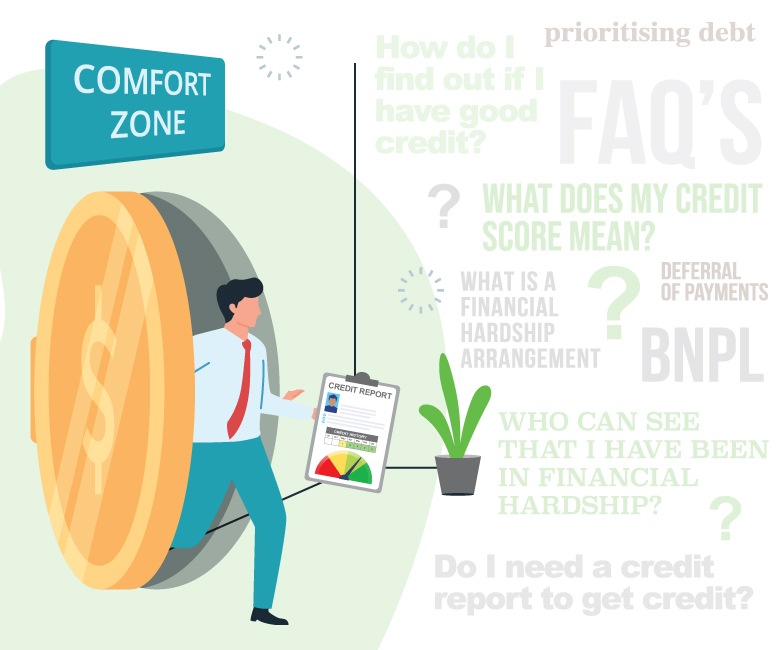The high cost of living, coupled with seemingly relentless price increases, escalating loan repayments, and stagnant wages, can pose significant financial challenges. In such circumstances, it becomes essential to ask pertinent questions and adopt proactive measures to regain control.
When facing financial difficulties, it's crucial to examine three key areas:
- YOUR EVERYDAY EXPENSES,
- YOUR INCOME, and
- YOUR CREDIT HEALTH.
Questions: YOUR EVERYDAY EXPENSES
-
Do you know where your money goes?
It’s often easy to just pay for things as they’re needed, and only think about money when it starts to look like there isn’t enough left to make it to pay-day. A great first step is to review your recent expenses line-by-line. This might sound time-consuming, but you can learn a lot.
Here are some pointers:
-
A three-month period is a good start, as this helps you capture those less-frequent expenses like utilities bills.
-
It can be useful to categorise expenses so you can compare them. The categories will depend on your circumstances, but some common ones include rent/mortgage, groceries, utility bills, transport, entertainment, personal loan repayments, optional extras.
-
Make sure you capture everything: an incomplete review won’t tell you everything you need to know.
-
There might be some other resources available from reputable sources to help you review what you spend. A good place to start is the MoneySmart budget planner.
Once you have a breakdown of where your money goes, some things might jump out at you – including how much you’re spending on certain products or services, some of which you might not get much use out of.
-
Are you getting the best deals?
Some things in life are essential: we all need to have the power on, the water connected, and our cars registered.
But if you haven’t shopped around lately, you might find that you’re paying hundreds of dollars more a year than you need to. One way to make it easier to make ends meet is to spend some time reviewing these common expenses, and shopping around to see if there’s a better deal available:
- Your credit accounts or loans
- Electricity/Gas bills
- Mobile phone contracts
- NBN/internet
- Insurance (car insurance, home/contents insurance)
Some things to bear in mind include:
- There can be comparison websites and tools out there that can help you shop around. A good example is Energy Made Easy, which is a government-run service that compares electricity and gas retailers based on your location and past usage.
- You may need to review your past bills and usage to work out possible savings: the cheapest phone contract might not be suitable if it includes far less data than you need.
- A good first step can be to call your existing retailer/service provider to see if they can offer you a better deal: in many cases they might offer you a lower price or a discount to avoid you taking your business elsewhere.
- It’s worth being aware of break-costs – for instance some contracts might charge a fee if you try to end them early. For these, the best time to shop around can be right before renewal.
Some shopping around, and changing providers if you need to, can make it much easier to balance your budget and meet your repayments without having to change your lifestyle.
-
Do you need to make some changes?
Sometimes there is no choice but to cut back on what you’re spending so that you can focus on the essentials. This might not be pleasant, but it’s better than running out of money and finding that you then can’t afford something you really need.
Here are some tips and things to think about:
- What options do you have for reducing what you spend? For instance, could you:
- substitute a meal out with a cheaper alternative?
- reduce the number of streaming services or source cheaper entertainment options?
- change where you shop or what you buy to make your money go further?
- It’s often easier to go through this exercise if you’ve worked out what your must-haves are, what you really value, and what you can do without if you must.
- Over the longer term it can be worth thinking about bigger changes too – do you have more space than you’re likely to need, or could you live in a different location if it meant cheaper rent?
Questions: YOUR INCOME
-
Is there anything you can do to change what you earn?
Facing rising loan repayments and high cost of living ultimately comes down to balancing what you earn and what you spend. It’s worth also thinking about whether there is anything you can do to increase your earnings, such as:
- Making a case for a pay increase at work.
- Looking to upskill/retrain so that you can move into a new, higher-paying job.
- Exploring the current employment market: when unemployment is low it can mean it’s a good time to look around and see if you can have both a new opportunity and a higher salary.
- Other options could include selling unwanted items or looking to increase your working hours (if that’s an option for your lifestyle).
Questions: YOUR CREDIT HEALTH
-
Do you need help?
If you find yourself in this situation, you should know:
- Struggling to make ends meet is nothing to be ashamed of. Hundreds of thousands of people – many with stable jobs – are finding the cost of living to be a real challenge. The sooner you reach out for help, the more options you may have.
- You can contact a financial counsellor to help you with your situation. They might be able to give you detailed advice that suits your circumstances.
- Lenders are required by law to respond to requests for help from people experiencing hardship. Most lenders have a range of possible solutions they will consider, such as long-term changes to a loan to permanently lower repayments and payment moratoriums (a period where no payments may be required).
- For those who are experiencing payment difficulties, it’s important to contact your lender as soon as possible. They may be able to provide a repayment plan or financial hardship assistance to support you through these challenging times.
- Prioritise mental health and well-being. If financial stress is impacting your mental health, reach out for free mental health support (Lifeline 13 11 44; Beyond Blue 1300 22 4636).
- Understand your credit report. This means checking your credit report and understanding the information in it and tracking your payment history and credit use to make informed decisions about managing your credit health.
-
Have you spoken to your lender or shopped around recently?
Just as you can save money on bills by shopping around, the same can be true of your loans.
Lenders often offer competitive interest rates for new business, so if you haven’t compared your current loans to what’s out there, you might be paying too much.
As with bills, some things to bear in mind include:
- A simple phone call to your current lender asking for a lower interest rate could save you thousands of dollars over the life of the loan.
- Comparison websites – or third parties like mortgage brokers – can help you find the best deal.
- If you do choose to change lenders, there will be some paperwork involved, so make sure you have your documents handy.
- Maintaining sustainable credit payments is essential to prevent financial stress and safeguard your credit health. As the cost of living rises and interest rates fluctuate, even a lower interest rate might not be sufficient to alleviate the financial strain of meeting your credit obligations. When faced with this predicament, one option worth considering is downsizing your home or asset.
It may be that, despite your best efforts and changes to your budget, you cannot afford to make your repayments. If you find yourself in or near this situation, the best thing to do is to contact your lender and tell them this.
It may be intimidating, but lenders have processes to help you if you are experiencing financial hardship.


